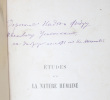"METCHNIKOFF, ÉLIE.
Études sur la Nature Humaine. Essai de philosophie optimiste. - [FOUNDING AND COINING GERONTOLOGY]
Paris, 1903. 8vo. Nice contemporary half calf with raised bands and gilt lettering to spine. Inner hinge a bit weak, but still tight. 3 leaves with a tear, no loss. Otherwise a nice and clean copy. Inscribed by the author to half-title, to the preeminent Russian Byzantinist F.I. Uspenky. (6), II, 399 pp.
Reference : 48299
First edition, first issue, presentation-copy, of the groundbreaking work, in which Metchikoff coins ""gerontology"" and establishes the field, which today is considered more important than ever, namely the study of the social, psychological and biological aspects of aging.Earlier on, Metchnikoff had made pioneering studies in immunology, and these led him on to the problems of biological ageing. His first work on the subject is the present, in which he coins the term ""gerontology"" and advances the idea that senile changes result from the toxins produced by bacteria in the intestine. In order to prevent these ""unhealthy fermentations"", Metchnikoff advocates the inclusion of sour milk on one's diet. As his ideas of ""right living"" were so closely connected with the consummation of large amounts of fermented milk or yoghurt made with a Bulgarian bacillus, his name actually came to be associated with a popular commercial preparation of yogurt (although he received no royalties). His studies into the potential life-lengthening properties of lactic acid bacteria, inspired Japanese scientist Minoru Shirota to begin investigating the causal relationship between bacteria and good intestinal health, which eventually led to the worldwide marketing of Kefir and other fermented milk drinks or probiotics, still extremely popular today.Apart from the consummation of yoghurt, Metchnikoff warned of eating uncooked foods, claiming that the bacteria present on them could cause cancer. Metchnikoff claimed he even plunged bananas into boiling water after unpeeling them and passed his silverware through flames before using it.""In his ""Nature of Man"" Metchnikoff argued that when diseases have been suppressed and life has been hygienically regulated, death would come only with extreme old age. Death would then be natural, accepted gratefully, and robbed of its terrors."" (D.S.B. IX: 334-35).He continued writing on ageing and death until 1910. In 1908 he shared the Nobel Prize for medicine with Ehrlich for his work on immunity.The interesting presentation-inscription reads: ""Dorogim Naste I Fedoru/ Ivanovich Uspenskim/ na dobruyu panijat ot Il. Metchnikova."" [In Russian, i.e.: For dear Nastya and Fyodor/ Ivanovich Uspenski/ in good memory from Il. Metchnikov."" Fyodor Ivanovich Uspensky or Uspenskij (1845-1928) was the preeminent Russian Byzantinist in the first third of the 20th century. His works are considered to be among the finest illustrations of the flowering of Byzantine studies in Tsarist Russia.Uspensky was educated at the University of St. Petersburg, with his first thesis (1872) dedicated to Nicetas Choniates. For two decades (1874-94) he read lectures at the Novorossiysky University in Odessa. This position allowed him to spend considerable time abroad.Uspensky's doctoral thesis (1879) dealt with the foundation of the Second Bulgarian Empire. Although he specialized in the Byzantine-Bulgarian relations and investigated the Slavic influence on the Byzantine economy, Uspensky also researched and wrote extensively on the Crusades.In 1894 Uspensky, who shared Slavophile ideals, decided to move to Constantinople in order to study and protect the surviving monuments of Byzantine antiquity, which had been neglected by the Ottoman authorities for centuries. He founded the Russian Archaeological Institute (headquartered at Studion) and presided over its pioneering archaeological research in Constantinople, Asia Minor, Macedonia and Bulgaria. In 1900, he was elected into the Russian Academy of Sciences. With the outbreak of World War I, Uspensky was forced to abandon his work and flee Turkey.Back in Petrograd, the 70-year-old professor was invited to edit the organ of Byzantine studies, ""Vizantiysky Vremennik"". After the October Revolution, he delivered lectures at the Leningrad University (1922-27) and, enduring criticism of the Bolshevik authorities, prepared for publication the results of a lifelong study - a monumental three-volume account of the history of the Byzantine Empire.Uspensky died in Leningrad in 1928. The posthumous publication of his magnum opus, based on numerous unpublished sources and unprecedented in scope, demonstrated the wide range of his scholarship. His book about the Trapezuntine Empire also appeared posthumously.
Bookseller's contact details
Herman H. J. Lynge & Son
William Schneider
Silkegade 11
1113 Copenhagen
Denmark
+45 33 155 335
Payment mode
Sale conditions
All items may be returned for a full refund for any reason within 14 days of receipt.
 Write to the booksellers
Write to the booksellers



